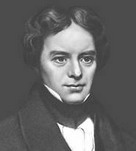Michael Faraday
Michael Faraday was born September 22, 1791 in Newington, near London, in the family of a blacksmith. The poverty of his parents did not allow him to get a complete primary education, and at the age of 13 he was sent for training to a bookbinder - the owner of a bookshop. At first he only carried the newspapers home, and then began to learn the skill of the bookbinder.

Working with books, he read a lot, especially he was interested in books on physics and chemistry. In the evenings, he began to attend various lectures on popular science topics, and one of the customers helped him to attend the lectures of chemist Sir Humphrey Davy at the Royal Institute.
In 1812, his studies ended, and the young Faraday decided to devote himself to science. He managed to get a seat at the Royal Institute from Davy himself, where he began his career as a lab technician, washing laboratory dishes. However, at the same time as work, he studied diligently, acquired experience, and his scientific horizon gradually expanded.
After returning in 1815 from a trip through Europe, in which he accompanied Davy, Faraday began to assist him in carrying out chemical experiments and solve some small tasks independently. Soon the first valuable results appeared - he received two new compounds of chlorine with hydrogen. He was also interested in the problems of acoustics, for which he prepared experiments for lectures at the Royal Institute and assisted in them.
And then a decade of persistent and versatile scientific work followed, during which, together with Davy, he conducted experiments on liquefying gases, studying alloys of steel, and carefully developed the technology for the production of new optical glasses.
In 1824, Faraday was elected a member of the Royal Society in London, and a year later he discovered benzene, a very important hydrocarbon. In the same year he became director of the laboratory of the Royal Institute, soon professor of chemistry, and after the death of Davy took his post.
1831 was the year of a very important discovery - Faraday discovered the phenomenon of electromagnetic induction , and this was the peak of his ten-year study. The discovery of electromagnetic induction has become the basis for the further development of electrical engineering, this discovery Faraday published as the first of 30 issues of the series "Experimental research on electricity," in which 3,000 paragraphs contain the majority of his scientific works. At the same time, Faraday studied chemical actions of electric current.
In 1833, he discovered two laws on the chemical action of current, which were subsequently named after him. Experiments and observations alternated with new discoveries. Faraday was the first to correctly explain the occurrence of electromotive stress in a galvanic cell, proved the existence of self-induction and introduced into physics the concept of a field, with which he explained electrical and magnetic phenomena. He also studied the influence of various materials on electrical power effects, and materials capable of transferring induction effects, called dielectrics.
After a period of tremendous success, but also hard work, fatigue and signs of deterioration of health appeared. Only after a long treatment in the Alps did he recover so much that in 1845 he was able to return to research work. In the same year he discovered the phenomenon of diamagnetism.
In the last years of his scientific work, Faraday studied the direction of magnetic lines of force around currents and magnets and other phenomena associated with the interaction of electric and magnetic forces. Faraday never forgot the beginning of his career and willingly hosted popular science lectures, always remembering the youth to which he dedicated his favorite book, The Chemical History of a Candle.
In 1858, Faraday left the Royal Institute and settled in Hampton Court near London in a house given to him by the English queen. In recent years, a gradual loss of memory began to cause him great trouble. He lived his life in a happy, although childless marriage. Faraday died August 24, 1867, in Hampton Court.


Comments
When commenting on, remember that the content and tone of your message can hurt the feelings of real people, show respect and tolerance to your interlocutors even if you do not share their opinion, your behavior in the conditions of freedom of expression and anonymity provided by the Internet, changes Not only virtual, but also the real world. All comments are hidden from the index, spam is controlled.